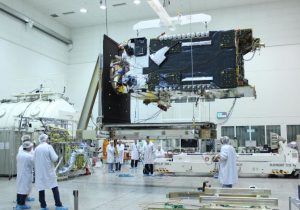
After losing out to Space Systems Loral for the AMOS-8 Satellite, it is being reported that Israel Aerospace Industries (IAI) is likely to receive a satellite order from the Israeli government in a bid to save its satellite business, and adding to the woes of struggling Spacecom Satellite Communications, Ltd.
According to a report by Globes Israel Business News, Spacecom notified the Tel Aviv Stock Exchange that it had learned from a government source that Israel intends to buy a new communications satellite from IAI.
This is the latest development in the recent battle between Spacecom and IAI over the future of satellite communications in Israel.
IAI has expressed concern that Spacecom’s decision to buy a satellite from a foreign company would adversely affect the future of its communications satellites business. Over the past few weeks, government officials involved in relevant discussions said that the government might contract directly with IAI for procurement of a communications satellite, and Spacecom’s announcement today indicates that this has happened.
In a recent hearing, government officials explained that if the state were to buy a satellite from IAI, it would make use of the orbital position that up to now had been promised to Spacecom; a position which is worth tens of millions of dollars. The new satellite will be positioned at 4°W, in accordance with the state’s needs. This represents a serious blow to Spacecom, after it announced a month ago that it would buy its planned AMOS-8 satellite from U.S. company Space Systems Loral, and not from IAI.
As previously reported, sources close to Spacecom said that the decision to buy AMOS-8 from a U.S. company was made because of time constraints, since IAI was unable to meet the short timetable for supplying the satellite.
Spacecom has struggled to regain its footing after its AMOS-6 satellite was destroyed eighteen months ago when the SpaceX Falcon 9 launcher on which it was mounted blew up on the launch pad.
 SpaceWatch.Global An independent perspective on space
SpaceWatch.Global An independent perspective on space




